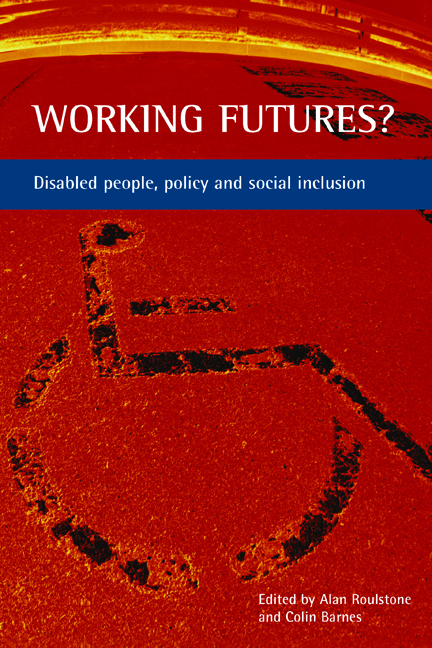Book contents
- Frontmatter
- Contents
- List of figures, tables and boxes
- Preface
- Acknowledgements
- List of abbreviations
- Notes on contributors
- Introduction Working futures: disabled people, employment policy and social inclusion
- Part One Work, welfare and social inclusion: challenges, concepts and questions
- Part Two The current policy environment
- Part Three Towards inclusive policy futures
- Index
- Also available from The Policy Press
twelve - Disabled people and ‘employment’ in the majority world: policies and realities
Published online by Cambridge University Press: 18 January 2022
- Frontmatter
- Contents
- List of figures, tables and boxes
- Preface
- Acknowledgements
- List of abbreviations
- Notes on contributors
- Introduction Working futures: disabled people, employment policy and social inclusion
- Part One Work, welfare and social inclusion: challenges, concepts and questions
- Part Two The current policy environment
- Part Three Towards inclusive policy futures
- Index
- Also available from The Policy Press
Summary
Introduction
Attempts to summarise conditions in ‘the majority world’ are fraught with great difficulty. Generalisations are dangerous. The difference in the economy and living standards between, say, Malawi and Thailand are enormous. (Malawi has a GNI of $160 per capita, a life expectancy of 37 years, and an infant mortality rate of 113 per 1,000 live births. Thailand has a GNI of $2,190, a life expectancy of 69.2 years, and an infant mortality rate of 24 per 1,000 live births.)
The emphasis in this chapter, therefore, is on broader economic deprivation or poverty rather than specific countries. Clearly employment and unemployment is only one aspect of poverty in the majority world.
Important indicative research has been conducted recently in three African countries (Malawi, Zimbabwe, and Namibia) on the living conditions of disabled people by the Norwegian research institute SINTEF, in conjunction with Southern Africa Federation of the Disabled (SAFOD). Its findings include the following, which apply to all three countries (SINTEF, 2003a, 2003b, 2004):
• mean monthly salaries for disabled people tend to be lower than for the non-disabled;
• those with mental or emotional impairments experienced more barriers to full participation in society than those with other types of disability;
• vocational training and welfare services were reportedly received by a very small percentage of those who needed them;
• emotional support is the most mentioned form of assistance needed;
• economic support was the second most mentioned form of assistance needed;
• within the family, the role of the person with a disability does not appear to be much affected by their disability status;
• schools were found to be accessible to only 20% of the disabled population, and the workplace to 26%;
• activity limitation and participation restriction scores are higher in urban than in rural areas, indicating that complex societies in a sense produce more disability.
Missing from these findings is any mention of unemployment figures. These are almost meaningless in countries where most people work in the informal, unregulated sector of the economy. This, indeed, is the largest difference between the employment situation in industrialised countries and that in poor countries. In Europe and North America, the informal sector scarcely exists except in the shadowy area of barely legal or criminal activity.
- Type
- Chapter
- Information
- Working Futures?Disabled People, Policy and Social Inclusion, pp. 175 - 190Publisher: Bristol University PressPrint publication year: 2005
- 2
- Cited by

